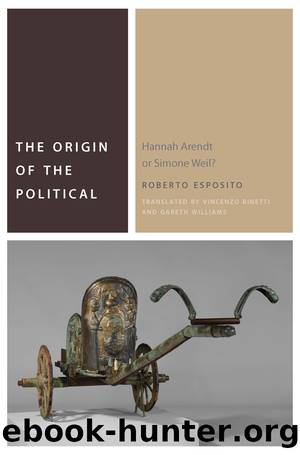The Origin of the Political by Esposito Roberto;Binetti Vincenzo;Williams Gareth;

Author:Esposito, Roberto;Binetti, Vincenzo;Williams, Gareth;
Language: eng
Format: epub
Publisher: Fordham University Press
8
FORCES
The Iliad constitutes the most perfect example precisely because nothingness can be perceived there in all its meaningful resonance. Weilâs definition of the poem as the âpicture of Godâs absenceâ (Notebooks, Vol. II-A, 405), as âmisery of the man without Godâ (Notebooks, Vol. I-C, 229) should not be interpreted merely in terms of lack. It should be interpreted in the sense of the powers that fill and inhabit, of the plenitude that installs itself most optimally in the absence of God, or, rather, as that absence itself in its most terribly âpositiveâ expression, as the content of Abandonment: âThe Creation is an abandonment. In creating what is other-than-Himself, God necessarily abandoned itâ (First and Last Notebooks, 103). It is in such abandonment that the dominium of force emerges and imposes itself. The Iliad does nothing more than give the most completeâthat is to say, the most transparentâexpression to this dominium.1 It is a work of art because it does not veil its own reality. It is an eternal work because the reality represented therein, qua uninitiated and interminable, is eternal. Weil had âdiscoveredâ this even before she penned her great Homeric essay, written between 1938 and 1939, which, due to the outbreak of war and Jean Paulhanâs hesitations, could only see the light of day between 1940 and 1941.2 Weilâs discovery is evidenced in the fact that she had already expressed the structuring principle of this work in her letter to Georges Bernanos: âWhen you know it is possible to kill without risking punishment or condemnation, you killâ (Ãcrits, 223). Furthermore, the biographical and conceptual relation between her essay on the Iliad and the civil war in Spain is consciously explicated in the first Notebooks.3
However, the text that most closely serves as a prelude to the essay on Homer is probably the fragment, dated 1939, titled âReflections on Barbarismâ: âI do not think we can form clear ideas about human relations without emphasizing the notion of force, in the same way the notion of relation is located at the center of mathematicsâ (Ecrits, 64). Here the ideology of progress is criticized as much as its complementary ideology of decadence. This is developed in favor of an evaluation of force understood not as measurement but as a universal constant of, and invariable in, human nature. It is the same formulation as the one that would leave its mark in the essay on the Iliad: âFor those dreamers who considered that force, thanks to progress, would soon be a thing of the past, the Iliad could appear as an historical document; for others, whose powers of recognition are more acute and who perceive force, today as yesterday, at the very center of human history, the Iliad is the purest and loveliest of mirrorsâ (âThe Iliad, or the Poem of Force,â 5). War is not the wound destined to cicatrize into the âregularityâ of politics, but its ineliminable foundation. It is for this reason that âthe reality of war is the most precious
Download
This site does not store any files on its server. We only index and link to content provided by other sites. Please contact the content providers to delete copyright contents if any and email us, we'll remove relevant links or contents immediately.
The remains of the day by Kazuo Ishiguro(7577)
Tools of Titans by Timothy Ferriss(6967)
The Black Swan by Nassim Nicholas Taleb(6205)
Inner Engineering: A Yogi's Guide to Joy by Sadhguru(5911)
Giovanni's Room by James Baldwin(5896)
The Way of Zen by Alan W. Watts(5813)
The Six Wives Of Henry VIII (WOMEN IN HISTORY) by Fraser Antonia(4800)
The Power of Now: A Guide to Spiritual Enlightenment by Eckhart Tolle(4771)
Astrophysics for People in a Hurry by Neil DeGrasse Tyson(4628)
Asking the Right Questions: A Guide to Critical Thinking by M. Neil Browne & Stuart M. Keeley(4599)
12 Rules for Life by Jordan B. Peterson(3747)
The Ethical Slut by Janet W. Hardy(3512)
Skin in the Game by Nassim Nicholas Taleb(3479)
Housekeeping by Marilynne Robinson(3421)
The Art of Happiness by The Dalai Lama(3391)
Double Down (Diary of a Wimpy Kid Book 11) by Jeff Kinney(3286)
Skin in the Game: Hidden Asymmetries in Daily Life by Nassim Nicholas Taleb(3273)
Walking by Henry David Thoreau(3237)
12 Rules for Life: An Antidote to Chaos by Jordan B. Peterson(3209)
